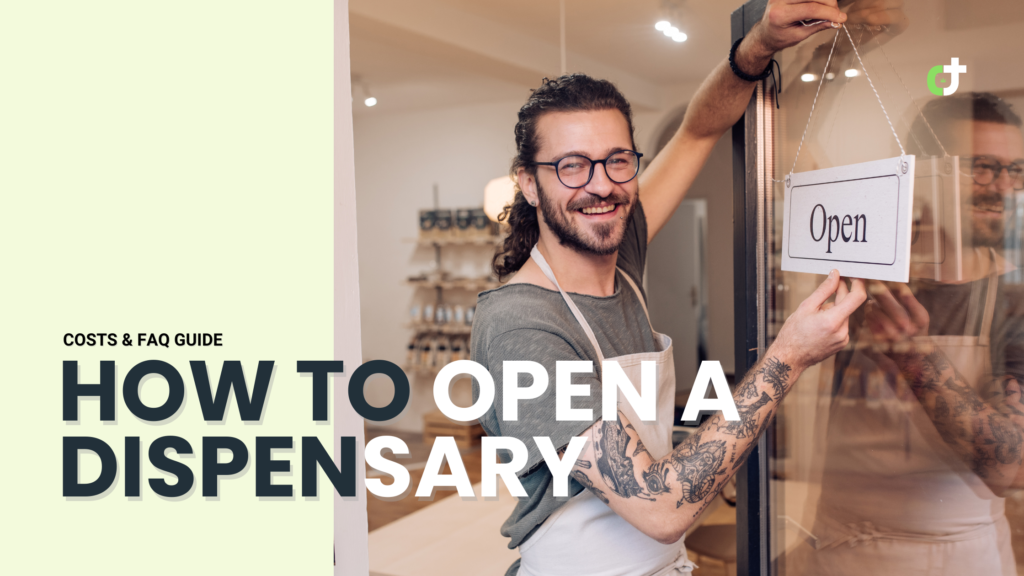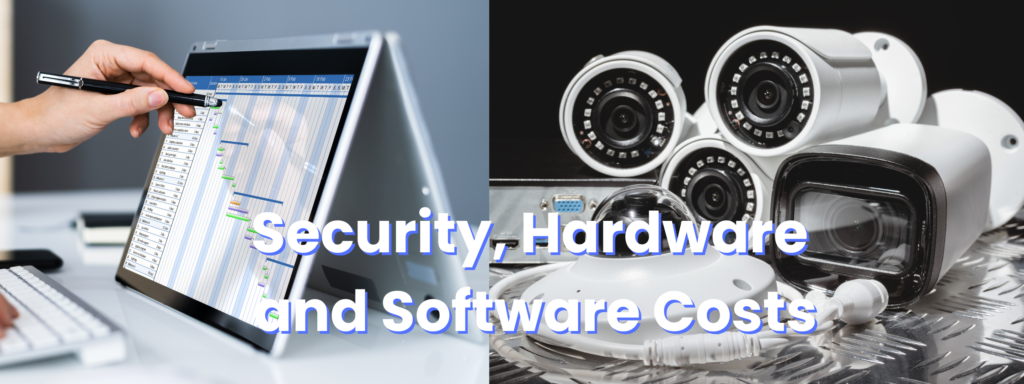
Introduction
The hemp industry has seen remarkable growth across North America, especially since the federal government legalized CBD in 2018. Today, nearly 65% of U.S. adults believe CBD is safer to consume than alcohol, yet only 44% believe CBD should be legal, according to the Forbes Health survey.
Despite healthy growth in sales, there is still misinformation among consumers as one-third of U.S. adults aren’t confident in their understanding of the differences between full-spectrum CBD, broad-spectrum CBD and CBD isolate which creates social challenges for dispensaries, owners, budtenders and regular consumers.
This guide aims to help prospective dispensary entrepreneurs understand how to open a dispensary. You will find everything from securing initial financing and developing a business plan to understanding state regulations and managing inventory.
Table of Content: Costs & FAQs
The cost of opening a dispensary can vary widely depending on expenses like location, licensing fees, and business size.
It also depends of the type of cannabis dispensary you want to persude. It could be for adult-use dispensary, medical marijuana dispensary, and hemp derived CBD retail shops.
You can find more details about an estimation for each type in this section of our blog: A- How much does it cost to open a dispensary? Setting an Estimation
Opening a dispensary involves multiple costs, see the full list here:
- Application & Dispensary Licensing Costs
- Real Estate Costs: Location, Location, Location
- Financial and Professional Services Costs
- Employee or Staffing Costs
- Security, Hardware and Software Costs
- Capital Investments
- Advertising/Marketing Costs
- Cannabis Product Inventory Costs
To know what to expect for each cost, keep scrolling.
Financing a cannabis dispensary can be challenging due to industry-specific banking restrictions.
However, there are several options:
- Personal investments or savings
- Loans from family and friends
- Specialty loans from cannabis-friendly credit unions
- Capital brokers who connect dispensaries with global investors
- Equity funding from industry-specific investors like venture capital firms
You can find more information in the blog section called, I don’t have enough money, how do I get funding to open a dispensary?
Starting a dispensary can be an exciting yet challenging venture.
After you have taken into consideration the previous questions, there are some questions you need to answer yourself:
Do You Understand the Industry? Familiarizing yourself with the legal landscape, market trends, and customer preferences is critical. You’ll need to stay informed about ongoing changes in cannabis laws and be ready to adapt your business accordingly.
Have You Completed Your Research? Research is fundamental before starting any business, especially in a complex industry like cannabis. Have you researched licensing requirements, startup costs, and state regulations? Additionally, have you explored potential locations, competitors, and consumer demands in your market?
Do You Have Sufficient Capital? Opening a dispensary requires a significant financial investment. Beyond the initial investment, you’ll need capital for ongoing expenses such as inventory, staffing, marketing, and compliance.
Go to our Are you ready to start your own dispensary? section and check other common questions before starting your dispensary.
Creating a well-structured business plan is crucial for launching a successful cannabis dispensary.
This section of our blog will serve as a roadmap for to building a business plan.
Go to How to draft a sucessful business plan for my own dispensary?
Selecting the right name for your dispensary is an important step in establishing your brand identity.
The name you choose should resonate with your target audience, reflect your business values, and align with industry trends.
Go to our section called How to choose your dispensary’s name?
The timeline for opening a cannabis dispensary can vary greatly depending on whether you are opening an adult-use or medical marijuana dispensary or a CBD-derived dispensary. However, it could take between 6 to 24 months.
Please, remember that each type comes with its own set of regulations, licensing processes, and operational challenges.
Go to our section, How long does it take to open a cannabis dispensary? to discover a time stemitation.
A- How much does it cost to open a dispensary? Setting an Estimation

As you go through life, you know for certain that most good things take work and that is the case for opening your first business.
Interpreting how to open a dispensary is an attractive business opportunity in the growing and volatile market, but it comes with an important initial investment and ongoing operational costs.
The total cost of opening and running a cannabis dispensary can vary significantly depending on whether you are entering the adult-use or medical marijuana sector, or if you are focusing on hemp-derived CBD product
Costs for Adult-Use or Medical Marijuana Dispensaries
For those looking to open a dispensary for adult use or medical marijuana, the financial investment is substantial. Typically, the startup costs can range between $450,000 to $1.5 million or more.
This range accounts for the diverse expenses involved, including licensing fees, securing a suitable location, renovations to meet state regulations, initial inventory costs, advanced security systems, and necessary technology such as point of sale systems and payment processors.
In addition, ongoing expenses such as staffing, marketing, and compliance management must also be considered when starting a cannabis dispensary.
Costs for Hemp Derived CBD Retail Dispensaries
Opening a dispensary focused on hemp-derived CBD products generally requires a lower initial investment compared to marijuana dispensaries. The costs for establishing a CBD retail cannabis dispensary can be around $50,000 more or less.
This includes the cost of leasing a retail space, purchasing initial inventory, minimal renovations, basic marketing to reach potential customers, and simpler regulatory compliance due to the federal legality of hemp following the Farm Bill of 2018.
Understanding these cost frameworks is crucial for anyone considering entering the cannabis industry.
Whether opening a high-investment marijuana dispensary or a more budget-friendly CBD store, prospective business owners must carefully plan and budget to ensure financial sustainability and compliance with all legal requirements.
B- What expenses or costs to expect?
1) Application & Dispensary Licensing Costs: $5K–$50K

Opening a cannabis dispensary involves navigating a complex regulatory landscape that intersects with marijuana medical licensing, marijuana recreational licensing, and CBD retail product regulations.
Each state and local jurisdiction has unique rules and processes for obtaining a license to sell hemp products.
While marijuana dispensaries often require strict licensing for medical or recreational sales, hemp dispensaries primarily focused on CBD products may have different requirements.
Just to give you an example, see three case studies, one for the state of North Carolina, another for the state of Michigan and the last for the state of Florida.
Case Study #1: A North Carolina Dispensary
If you want to open a dispensary in North Carolina, you don’t require a specific license to sell CBD retail products, requiring only regular business documentation. This can simplify the entry process for entrepreneurs looking to sell CBD without the extensive licensing needed.
Case Study #2: A Michigan Dispensary
For Michigan, there are several types of licenses available for cannabis businesses, each one with different aspects of the cannabis industry. Here’s a brief overview of the key licenses:
Adult-Use Retailer License
This license allows hemp businesses to sell recreational cannabis to adults aged 21 and over. It permits the sale of cannabis products and related accessories. However, it does not cover the sale of medical cannabis.
Pre-qualification fee: $3,000
Initial License Fee: $15,000
Annual Renewal Fee: $15,000
Microbusiness License
Designed for small businesses, this cannabis license allows the cultivation of up to 150 cannabis plants, processing into products, and sales to adults over 21. It supports vertical integration, enabling businesses to manage all stages from cultivation to sale.
Initial License Fee: $8,300 – $18,600
Annual Renewal Fee: $8,300 – $18,600
Designated Consumption Establishment License
This license is for businesses that provide a space where adults aged 21 and over can consume cannabis products on-site.
Initial License Fee: $1,000
Annual Renewal Fee: $1,000
Event Organizer License
This license is for businesses that organize events where cannabis products can be consumed on-site.
Initial License Fee: $1,000
Annual Renewal Fee: $1,000
Other License Types
Michigan also offers licenses for specific operational roles within the cannabis industry, such as:
Marihuana Secure Transporter
Marihuana Safety Compliance Facility
Class A, B, C Marihuana Growers
Case Study #3: Florida Dispensary
Starting a dispensary in Florida involves navigating a complex and expensive licensing process. Obtaining a dispensary license in Florida is challenging due to strict state regulations.
The Department of Health only accepts applications for Medical Marijuana Treatment Center (MMTC) licenses periodically and in limited batches.
An MMTC license permits you to engage in all aspects of the cannabis business, including cultivation, processing, distribution, and transportation.
Licensing
The costs involved in opening a dispensary business in Florida include:
Application Fee: The application fee is $146,000 and is non-refundable.
License Renewal: The license must be renewed every two years, costing $1.33 million each time.
Performance Bond: You must maintain a performance bond of at least $2 million upon approval.
2) Real Estate Costs: Location, Location, Location: $25k– to heaven

High Visibility vs. Zoning and Demographics
When researching how to open a dispensary, one of the first steps is to understand the legal landscape in your area, so choosing the right location is one of the most important steps.
This decision involves not just finding that dreamy spot with high visibility and foot traffic, but also navigating a serious number of regulatory hurdles.
As liquor stores and other R-rated types of businesses, cannabis dispensaries must comply with state and local regulations that often dictate how close they can be to schools or even other dispensaries.
Additionally, zoning laws, traffic patterns, demographics and accessibility, and parking availability play important roles in determining the ideal location. Securing a location is only part of the challenge.
Are you going to lease or buy?
Before considering some suitable brick-and-mortar locations for your cannabis dispensary, you must decide whether to buy or lease. The cost of real estate in the cannabis industry tends to get higher due to its specialized nature.
Annual expenses for marijuana store real estate might reach $100,000. Moreover, initial investments often include significant remodeling costs to comply with regulations, align with your brand identity, and ensure optimal store flow, which could add an additional $50,000 upfront.
It’s fundamental to thoroughly understand and comply with all pertinent state and local regulations before starting a dispensary. This ensures your new business operates legally and is positioned for long-term success in the competitive cannabis market.
3) Financial and Professional Services Costs: $50K+

Understanding the financial requirements is essential when learning how to open a dispensary. Dispensary owners must employ dedicated financial tools and services that not only improve efficiency, but also ensure full compliance with state and federal laws.
Banking and Financial Services
Several financial institutions specialize in providing services to the cannabis industry. These services include business checking accounts, loans, and merchant services.
It’s important to partner with a bank that understands the nuances of cannabis regulations to ensure all transactions are compliant and transparent.
Accounting and Tax Services
One of the critical things in how to open a dispensary is understanding the complexity of tax laws surrounding cannabis businesses, especially the implications of IRS tax code 280E, which prohibits deductions for expenses related to the trafficking of Schedule I or II substances, makes it essential to have an experienced cannabis accountant.
These professionals can help navigate audits, optimize tax payments, and ensure compliance with state and federal laws.
Legal Services
For those exploring how to open a cannabis dispensary, legal counsel is indispensable in the cannabis industry, given the rapidly changing legal landscape.
Attorneys specializing in cannabis law can assist with license applications, compliance with state and federal regulations, contract negotiations, and litigation defense.
Consulting Services
Cannabis consultants provide valuable insights into market trends, licensing, facility design, operations, and product development.
Investing in these professional services not only helps in maintaining compliance, but also in strategically growing the business within the complex framework of the cannabis industry.
4) Employee or Staffing Costs: $250K+

An important aspect of how to open a dispensary, whether it’s retail or wholesale, is building a knowledgeable and friendly team a dispensary.
This involves more than just hiring experienced retail workers; it requires finding individuals who can navigate the unique complexities of the cannabis market.
Given the high demand for skilled retail employees, assembling the ideal team for your dispensary can be challenging yet critical for success.
Classic Possitions in A Cannabis Dispensary
- General Manager
- Budtender (Sales associate, sales representative)
- Inventory Manager and
- Operations Manager or Compliance Manager
- Security Guard
Average pay rate per hour or yearly:
General Managers: $50K to $100K
Budtenders or Sales Reps: $17/hour to $30/hour
Operations or Compliance Manager: $70K – $90K
5) Security, Hardware and Software Costs: $50K

A common challenge in figuring out how to open a dispensary is securing the right security and tech infrastructure.
These are critical components of a successful dispensary business, given the high-value nature of the inventory and the strict regulatory requirements of the cannabis industry.
Security Systems
A robust security system is mandatory when opening a cannabis dispensary. This includes high-resolution surveillance cameras, alarm systems, and access control systems that monitor and secure all areas of the facility.
These systems not only deter theft but also ensure compliance with state regulations that often require video recordings of all transactions and interactions within the dispensary.
These systems not only deter theft but also ensure compliance with state regulations that often require video recordings of all transactions and interactions within the dispensary.
Essential Hardware
In the process of learning how to open a retail dispensary, integrating hardware can streamline operations and enhance the customer experience.
The hardware setup for a dispensary includes more than just security equipment. Dispensaries also need to invest in computers, TVs for displaying product information and promotions, printers for printing receipts and labels, and cash registers and drawers.
Cannabis Dispensary Software
Alongside physical hardware, cannabis dispensary software plays a vital role in the dispensary business’s seamless supply chain management.
This includes point of sale (POS) systems, inventory management software, and customer relationship management (CRM) systems.
These tools help dispensaries manage their inventory effectively, comply with state tracking requirements, and enhance customer engagement through targeted promotions and loyalty programs.
A Dedicated Point of Sale (POS) System
A good dedicated cannabis POS system will help retail and wholesale dispensaries maintain accurate records, streamline operations, and ensure that all transactions comply with the strict regulations of the cannabis industry.
Compliant Payment Processor
Due to the federal classification of cannabis, many traditional banks and payment processors do not service cannabis-related businesses. As a result, finding a compliant payment processor is essential for handling transactions securely and legally.
Importance of Integration
Seamless integration is a crucial concern when learning how to open a dispensary.
A cannabis dispensary needs to integrate their dedicated POS system with a compliant payment processor.
This integration allows for smoother transactions, better security, and more reliable compliance with regulatory requirements.
It also provides a better customer experience, as transactions can be handled more efficiently and with fewer errors.
How To Choose a Good Dedicated cannabis POS Software and Other Hemp related Apps?
Ensuring State Compliance
Nowdays, using a cannabis POS software with API integration is crucial for automating reporting tasks. This integration not only saves time, but also ensures compliance with state regulations, providing peace of mind for dispensary owners.
Overview of Seed-to-Sale Tracking Systems
Every state that allows legal cannabis sales has an official seed-to-sale tracking provider. These systems track the entire lifecycle of cannabis products from cultivation to sale, ensuring transparency and compliance with state laws.
Key Players in Seed-to-Sale Tracking:
- Metrc (Marijuana Enforcement Tracking Reporting Compliance):
- Developed by Franwell, Metrc is a leading seed-to-sale tracking system.
- States using Metrc include: Alabama, Alaska, California, Colorado, Washington D.C., Louisiana, Maine, Maryland, Massachusetts, Michigan, Minnesota, Mississippi, Missouri, Montana, Nevada, New Jersey, Ohio, Oklahoma, Oregon, Rhode Island, South Dakota, and West Virginia.
- BioTrackTHC:
- BioTrackTHC provides cannabis and hemp traceability systems for tracking and reporting.
- States using BioTrackTHC include: Arkansas, Connecticut, Delaware, Florida, Hawaii, Illinois, New Hampshire, New Mexico, New York, North Dakota, and Virginia.
- Leaf Data Systems (Powered by MJ Freeway):
- This is another seed-to-sale cannabis tracking solution.
- States using Leaf Data Systems include: Pennsylvania, Utah, and Washington.
By choosing the right POS software that integrates seamlessly with your state’s seed-to-sale tracking system, you can ensure your dispensary operates within legal guidelines while maximizing efficiency and productivity.
Hardware Compatibility
Ensure that the cannabis-related software you choose is compatible with your existing hardware. Opt for cloud-based solutions that do not require specific hardware to avoid additional costs.
Reliable Customer Support
Quick setup and ongoing support are vital when choosing a dedicated cannabis POS software. During software demos, ask about the customer support process and ensure that you will receive continuous assistance to address any issues that arise.
User-Friendly Interface
When evaluating different systems, consider how user-friendly they are and whether they will improve your team’s efficiency.
Built-in Compliance Features
A dedicated POS software should not only help with state reporting systems like Metrc but also ensure adherence to state marijuana laws, such as purchase limits and age verification.
Select software that includes built-in safeguards to meet your market’s specific needs, ensuring comprehensive compliance.
Robust Inventory Management
Choose a dedicated POS software with strong inventory capabilities for your cannabis dispensary, including features that simplify auditing, such as mobile apps or iPad apps. The right software streamlines inventory processes, ensuring accuracy and saving time and money.
Discrepancy Reporting
Your Metrc inventory, eCommerce inventory, physical inventory, and POS inventory should always be aligned. Software with built-in tools to identify and resolve inventory discrepancies is crucial.
Activity Tracking
Another important facet of how to open a dispensary, especially, in an industry prone to loss and theft, is tracking all activities within your store.
A point of sale (POS) software should allow you to see which employees performed specific actions, such as making sales, opening drawers, or moving inventory. This transparency helps in monitoring and securing operations.
Open API Integrations
Integration capabilities are crucial, especially if you plan to use online menus, delivery services, loyalty programs, or other partner technologies. An open API allows for seamless integration with various tools, enhancing your business capabilities.
Specialization and Integration
Instead of choosing one software for all aspects of your business, consider selecting specialized software for each part of your operations, such as cultivation, manufacturing, retail and wholesale. While a single system may offer better visibility, specialized software often performs better in its specific area.
Recurring Software Expenses
After the initial setup, a cannabis dispensary should budget for ongoing software expenses. This typically includes software license renewals, updates, and technical support, which can amount to around $2,000 per month.
These recurring expenses ensure that the software systems are up-to-date, secure, and functioning optimally to support day-to-day operations for your business.
6) Capital Investments: $25k–$100k+

When opening a dispensary, certain capital investments are essential for setting up a functional, compliant, and customer-friendly business.
In the $25,000 to $100,000 or more investment range, prospective dispensary business owners can cover several critical areas that will form the backbone of their operations such as facility setup and renovations, security systems, technology and POS system, initial product inventory, licensing and fees, and more
7) Advertising/Marketing Costs: $25k–$100k

One of the critical steps in how to open a dispensary is producing an effective advertising and marketing campaign. This is vital for any cannabis dispensary to attract and retain customers in a competitive market.
Due to the unique regulations surrounding cannabis, dispensaries must navigate a complex landscape to promote their products responsibly and effectively.
Bunding with the Community
Building relationships within the local community can be highly effective. This might involve sponsoring local events, participating in community service, or hosting educational sessions about cannabis safety and benefits. Such initiatives can enhance the hemp dispensary’s community presence and foster goodwill.
Loyalty Porgrams and Promotions
Implementing loyalty programs can encourage repeat business by rewarding returning customers with discounts, special offers, or exclusive products.
Promotions like “first-time customer discounts” or “birthday specials” can also be effective in attracting new cannabis customers and increasing sales.
Building a SEO Optimized Website + Ecommerce
One of the critical steps in how to open a dispensary is building a brand that resonates with your target audience online, so creating an effective website is crucial for your dispensary business.
While a cannabis dispensary require a straightforward site, it should efficiently transmit basic information about your products and store details.
Integrating an e-commerce into your dispensary’s website, despite regulatory limitations on direct cannabis sales, plays a key role in improving customer engagement and increasing operational efficiency.
Allowing customers to view your product catalog online, you can cater to their preferences and streamline the purchasing process. Customers can select their products at their convenience and simply pick them up in-store, effectively bridging the gap between online browsing and physical purchasing.
This hybrid approach not only meets regulatory standards but also improves the shopping experience, making it more accessible and user-friendly. It’s vital for your chosen dedicated Point of Sale (POS) software to seamlessly integrate with your online inventory to ensure real-time accuracy of inventory data.
8) Cannabis Product Inventory Costs: $1,500 per Pound (lb)

When figuring out how to open a dispensary, sourcing high-quality cannabis products is a key consideration. For dispensaries, effectively managing inventory costs is essential to maintain profitability and operational efficiency.
With the price of cannabis typically around $1,500 per pound, understanding and budgeting for product inventory is necessary.
What products to focus on?
For a business owner, especially, as a cannabis dispensary entrepreneur, you will need to analyze the market and the consumer demographics.
Market Analysis of A Dispensary
- Discuss the growth trends in the cannabis industry, specifically, for a dispensary.
- Include data on market size, projected growth, and consumer trends.
- Highlight key players in the industry and their market share.
Consumer Demographics:
- Detail the primary demographics of cannabis consumers.
- Discuss how consumer preferences are shifting and what products are becoming more popular for a legal cannabis dispensary.
Cannabis Products Categories:
Cartridges, Concentrates, and Extracts – Edibles – Flowers – Tinctures – Topicals
Cost Implications
At $1,500 per pound, the cost of stocking a diverse and appealing range of cannabis products can be substantial. Dispensaries must carefully plan their inventory purchases based on anticipated demand, market trends, and customer preferences.
This price point reflects not just the cost of the raw product but also the investment in quality assurance, compliance with state regulations, and the potential for varied product types and potencies.
Other Aspects To Take Into Consideration
C- I don’t have enough money, where can I find more funding?

Financing a cannabis dispensary presents unique challenges, primarily due to the reluctance of traditional financial institutions to engage with the industry.
However, you have several source options with whom you can focus your attention. Here are some viable source options for entrepreneurs looking to fund their hemp or cannabis ventures:
Personal Investment or Self-funding
Many cannabis entrepreneurs start by using their own funds, a common strategy across various sectors. In the cannabis market, personal investment is particularly prevalent due to the difficulties in obtaining traditional financing.
Family & Friends
One common question that comes up when planing to start a dispensary is, ‘How to open a dispensary with minimal upfront investment?’ And the answer is complicated, as it lies in careful planning and possibly partnering with investors.
Raising capital through family and friends is a traditional route that remains effective when to start to consider opening a dispensary. With banks often hesitant to lend, personal networks become a crucial funding source.
Specialty Loans
As major U.S. banks generally steer clear of the cannabis market, alternative financial institutions like credit unions and niche banks have begun to fill the gap.
In regions like the US, there are banks that have special financing programs for cannabis businesses. For example, FundCanna, and Safe Harbor Fiinancial.
Capital Brokers
Engaging a broker who specializes in the cannabis industry can be an effective way to connect with global investors interested in the sector. Brokers match businesses with investors ready to support emerging markets like cannabis.
The landscape for cannabis financing has evolved significantly, especially as the industry has proven resilient and profitable through challenges like the COVID-19 pandemic, which saw cannabis businesses labeled as essential.
This resilience has begun to shift investor sentiment, promising even more changes ahead as legal barriers are addressed and more financial institutions consider entering the market. Remember, though, that securing investment often involves sacrificing equity, a cost that needs careful consideration.
Strategic Partnerships
The growing interest in the cannabis market means there are plenty of potential partners looking to invest. Forming partnerships can provide not only capital but also additional expertise to strengthen the business.
Equity Funding
Equity funding involves raising capital by selling shares of your business. By offering ownership stakes in your dispensary, you can attract financial support from various sources.
These include venture capital firms, angel investors, crowdfunding platforms, and even personal networks like friends and family.
If you’re looking for something a bit more high-profile, consider reaching out to industry-specific investors like Snoop Dogg’s Casa Verde Capital, and Entourage Effect Capital.
Are You Ready to Start Your Own Dispensary?
Starting a dispensary can be an exciting yet challenging venture.
After you have taken into consideration the previous questions, there are some questions you need to answer yourself:
Do You Understand the Industry?
Familiarizing yourself with the legal landscape, market trends, and customer preferences is critical. You’ll need to stay informed about ongoing changes in cannabis laws and be ready to adapt your business accordingly.
Have You Completed Your Research?
Research is fundamental before starting any business, especially in a complex industry like cannabis. Have you researched licensing requirements, startup costs, and state regulations?
Additionally, have you explored potential locations, competitors, and consumer demands in your market?
Do You Have Sufficient Capital? Opening a dispensary requires a significant financial investment. Beyond the initial investment, you’ll need capital for ongoing expenses such as inventory, staffing, marketing, and compliance.
Do You Have a Strong Business Plan? A comprehensive business plan is essential for success. Your plan should outline your financial projections, target market, operational strategy, and marketing approach.
A solid business plan also helps secure funding from investors or lenders, giving your dispensary a clear roadmap for growth.
Are You Ready to Navigate Compliance? Compliance with state and federal laws is one of the biggest challenges in the cannabis industry.
Are you prepared to manage seed-to-sale tracking, inventory auditing, and stringent security requirements?
Having a dedicated compliance officer or using cannabis-specific software can help ensure your dispensary remains in good legal standing.
E- How to Draft A Successful Business Plan for Your Own Dispensary?

Having explored the basic costs involved in starting a dispensary, the next step as a prospective cannabis business owner is to grasp that regulations vary significantly by state regarding how to legally open a dispensary.
Careful research and planning are critical at the beginning. So before drafting your business plan or applying for a cannabis dispensary license, it’s important to understand the specifics of the application process.
Many states and regions offer detailed guidelines on their official websites outlining each step required to secure a dispensary license, which you should examine carefully.
Please focus on answering these key questions when you start to plan your next cannabis venture:
- – What local laws and regulations do I need to know about cannabis and dispensaries?
- – What are the prices to secure an optimal location for a new retail dispensary?
- – What legal aspects of the licensing process do I need to know about?
- – What financial arrangements do I need to know and do when starting?
Some Components of a Successful Cannabis Business Plan
1. Seize The Opportunity
Every business needs to identify a unique opportunity that sets it apart from competitors. So the best way to achieve it is by conducting thorough research on the competitive landscape in your area and identifying the problems your business can solve.
This section is crucial to make fall in love investors, as they seek a strong competitive advantage that promises a high return on investment. Do not forget to include research on target markets and demographics.
2. Excecution
This section covers the execution of your business operations, divided into three sub-sections:
- Marketing and Sales Plan: Include your community outreach efforts.
- Location and Facilities: Identify municipalities of interest, cost considerations, and any legal or zoning restrictions.
Operations: Detail daily operations, including hours, logistics, sourcing, staff roles and shifts, and technology like the cannabis POS system you would like to use and metrics of performance.
3. Company
Detail your company’s structure and leadership team. List all owners and their stakes, and describe the legal business structure (LLC, Corporation, Partnership).
Highlight the relevant experience and skills of your management team and how they contribute to your business’s success.
4. Financial Plan
The financial plan is a paramount concern when understanding how to open a dispensary. Investors will closely scrutinize the financial section of your plan, which should include:
- Forecasts: Explain how you derived estimated values and projections.
- Financing: Clearly state your capital sources and how you’ll use them.
- Future Projections: Base these on accurate data and have them reviewed by an accountant or financial planner.
5. SWOT Analysis
Create a SWOT analysis (Strengths, Weaknesses, Opportunities, Threats) specific to the cannabis industry so you as the owner have a good understanding of where you at and what needs to be improved.
F- How To Choose Your Dispensary's name?
When you start planning a dispensary, choosing the right business name could seem the least of your problems but when the time comes, it will be a critical first step.
Before even registering your hemp-derived business or visiting your local Register of Deeds office, it’s important to select a name that reflects your brand’s identity and aligns with industry trends.
Start by brainstorming a list of potential names, focusing on terms commonly associated with CBD businesses and what you want your brand to represent:
Example:
- Wellness-Oriented Names: If your dispensary is focused on medical marijuana, consider names that emphasize health, healing, or nature. For example, “Green Wellness” or “Healing Botanicals.”
- Recreational Names: If your target market leans more toward recreational cannabis, a fun or playful name like “Happy Herb” or “Green Zone” could be effective.
Location-Based Names:
Adding a geographic reference to your dispensary name can help establish a local identity and appeal to customers in your region. It also helps build trust and connection within your community. Check this examples: “Pacific Coast Dispensary,” “Mile High Buds,” or “Gotham Greens”.
Zoning Regulations: Be mindful of local regulations around cannabis advertising. Some states or municipalities may have restrictions on using cannabis-related terms in signage or business names.
Other popular keywords are: CBD, Delta, Hemp, Dispensary, Monk, Canna, Bonkers, Buds, Botanicals, Seed, Plus, Nation, Holistic, Green, Soul, Top, Map, Mindful, and Genius.
These words can help create a name that resonates with customers and clearly communicates the nature of your business.
Utilizing tools like an AI-powered CBD business name generator can also simplify this process, ensuring your dispensary’s name is both unique and marketable. A well-chosen name sets the foundation for your brand’s success.
Trademark Warning: Before you have chosen your dispensary’s name, make sure it’s not already in use by another business.
Conduct a trademark search to ensure the name is available and can be legally protected. This will help you avoid potential legal disputes in the future.
Trademark Search Tools: Use resources like the U.S. Patent and Trademark Office (USPTO) website to search for existing trademarks.
Domain Name Availability: Ensure the domain name for your dispensary’s website is available.
Get feeback:
Get feedback from potential customers, business partners, friends and industry experts.
Test how the name resonates with others and whether it conveys the right message. This feedback can help refine your choice before making it official.
G-How Long Does It Take to Open a Cannabis Dispensary?
Adult-use Dispensary | Medical marijuana Dispensary | CBD-derived Retail Dispensary | |
|---|---|---|---|
Time Estimation | 12 to 24 months | 12 to 24 months | 6 to 12 months |
The timeline for opening a cannabis dispensary can vary greatly depending on whether you are opening an adult-use or medical marijuana dispensary or a CBD-derived dispensary.
Each type comes with its own set of regulations, licensing processes, and operational challenges.
1. Adult-Use and Medical Marijuana Dispensaries
Licensing and Approvals: Opening a dispensary that sells adult-use or medical marijuana typically takes the longest due to strict state regulations and complex licensing requirements.
On average, it can take 12 to 24 months to get your dispensary fully operational. The steps involved include securing local and state licenses, finding a compliant location, and meeting all security and regulatory standards.
State-Specific Timelines: In highly regulated states like California or Michigan, the licensing process alone can take several months, including a pre-qualification phase, application review, and site inspections.
Zoning and Compliance: After acquiring the license, finding a location that complies with zoning laws and completing any required renovations to meet state regulations (such as security and operational standards) can add several more months to the timeline.
2. Hemp-Derived CBD Dispensaries
Faster Timeline: CBD-derived dispensaries usually have a quicker startup timeline compared to marijuana dispensaries because CBD is federally legal under the 2018 Farm Bill.
The process can take 6 to 12 months, as the regulatory hurdles are often less stringent.
Licensing Simplicity: Many states do not require special licenses to sell hemp-derived CBD products, although general business licenses and permits will still be necessary.
Location and Setup: With fewer regulatory constraints, it’s often easier to find a suitable location and open for business more quickly. However, it’s essential to still comply with local zoning laws and health regulations.
Additional Considerations
Funding and Real Estate: Securing funding and finding real estate can significantly impact the timeline. The process of raising capital and securing a lease or purchasing a property can take several months, regardless of whether you’re opening a marijuana or CBD dispensary.
Staffing and Training: Hiring knowledgeable staff and ensuring they are trained on both product knowledge and compliance regulations can also extend the time to open.
State-Specific Delays: Some states have limited application windows for cannabis licenses, which may delay your ability to apply. Additionally, states with competitive licensing programs may result in long waiting periods if applications are reviewed in batches.
Conclusion
Understanding how to open a dispensary is a complex endeavor that requires careful planning, significant investment, and a thorough understanding of the legal and market landscape.
As we’ve explored, the process involves navigating a labyrinth of regulations, securing financing, finding the perfect location, and building a reliable team. From initial licensing and real estate costs to marketing and inventory management, each step is crucial to the success of your business.
In addition to the financial and logistical aspects, the cannabis industry presents unique challenges and opportunities. Staying informed about market trends, understanding your consumer base, and continually adapting to changes in regulations are essential for long-term success.
Building strong relationships within the community, offering high-quality products, and maintaining compliance with all laws will help establish your dispensary as a trusted and reputable business.
As you move forward, remember that thorough research and meticulous planning are your best tools. Create a robust business plan, seek out reliable funding sources, and don’t hesitate to consult with industry professionals to guide you through the process.
Whether you’re focusing on adult-use or medical marijuana, or hemp-derived CBD products, the key to success lies in your ability to manage the myriad aspects of running a dispensary with diligence and foresight.
Ready to start your journey as a cannabis entrepreneur? Begin by researching your local regulations.
The information provided is for educational purposes only and not legal advice. We encourage you to consult a legal expert to address your specific circumstances.


